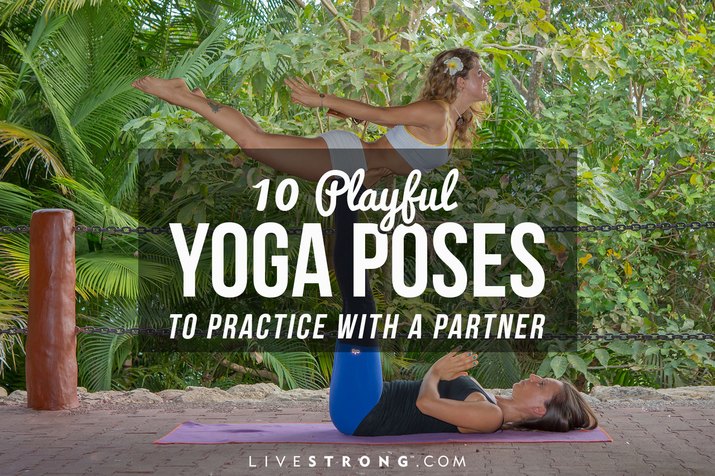
Overview
Traditionally, yoga has been a solo practice. It's a time of self-reflection and introspection. But it doesn't always have to be. You can learn just as much about yourself and your body while practicing with a partner. Plus, partner yoga (often referred to as AcroYoga because it combines acrobatics and yoga) has the added benefit of building trust between you and your partner. And then there's the additional core strength needed for the person in the air (the flyer) and the lower-body strength required of the person supporting the flyer (the base). So grab a partner and get inspired by the following 11 yoga poses built for two.
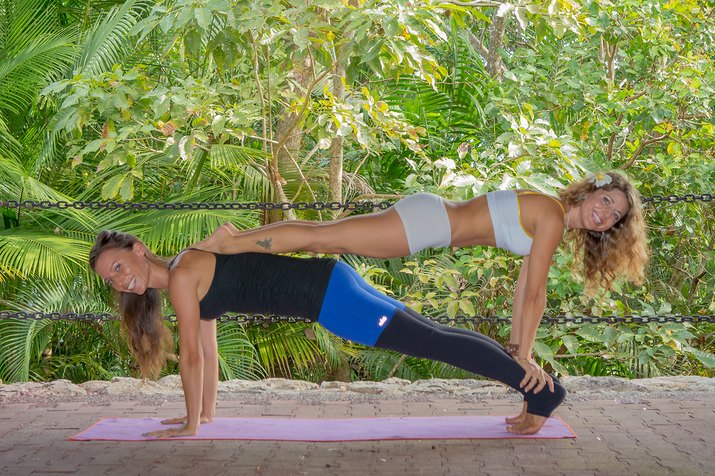
1. Double Plank
This is a great pose to start with. Although it does require a lot of core strength, it's very low to the ground, and with proper technique you will notice it can be easier than you think. HOW TO DO IT: Start with the taller or stronger of the pair in a plank on the bottom. Palms are under shoulders, legs are straight and the core is engaged. Then the top person -- facing the feet of the base -- steps across the hips of the base. Folding forward, place both palms securely on the ankles of the base, core strong and engaged, and step one foot at a time onto the shoulders of the base. Hold for three to five breaths if you can before slowly stepping down one foot at a time. If possible, switch so the person who was the base is on now top.
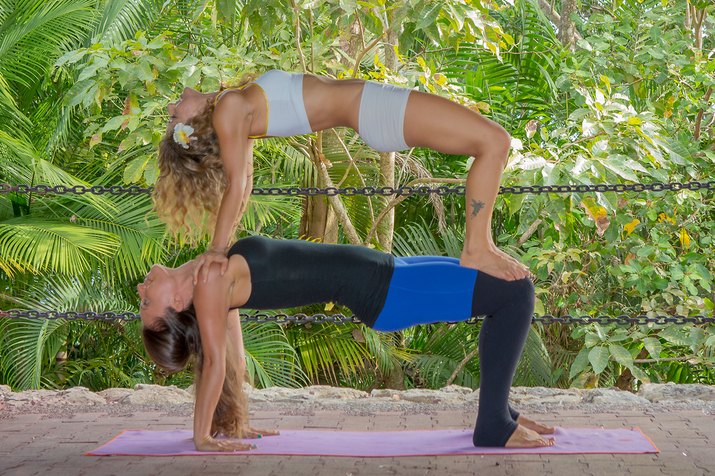
2. Double Table
This pose is so simple and accessible, yet it's very powerful to practice. HOW TO DO IT: The base starts in a table position facing the ceiling with feet hip-distance apart and hands shoulder-distance apart. Lift your hips as high as you can so your knees, hips, back and head are in a single line. The top partner will step across the base's body, facing the base's knees. Place one hand at a time on the base's shoulders, engage your core and bandhas and gently and firmly step one foot at a time on the base's knees/lower thighs. Hold for three to five breaths and step down with grace and control.
Related: The Best Yoga Moves for Your Back
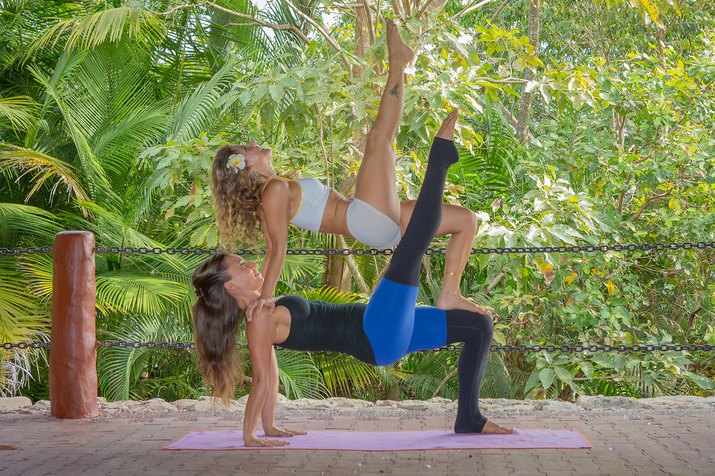
3. Extended Double Table
This is a more challenging version of the double table, as you must balance with one leg extended. HOW TO DO IT: Start in the same position as double table, the flyer balancing on the base's shoulders and knees/lower thighs. At first, just the flyer should lift her leg, and if both feel secure and strong, the base can lift the leg on the same side. Hold for three to five breaths and switch sides. Dismount is the same as the basic double table.
Related: 10 Yoga Moves to Remove Stress and Relax You at Bedtime
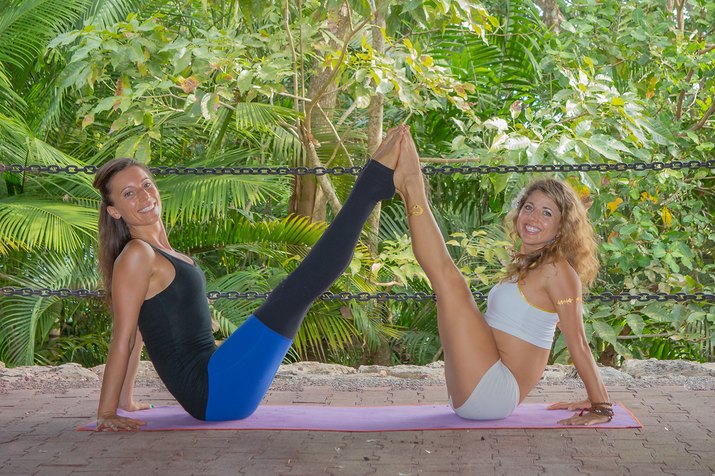
4. Double Boat
This is the best pose to strengthen your core and improve balance. HOW TO DO IT: Start seated facing each other with knees bent. Touching the soles of your feet together, place your hands behind you to stabilize and lift the legs toward the sky. Engage the core, lengthen the spine and lift the heart toward the sky. Keep your back straight and your core engaged the entire time. Hold for three to five breaths and release.
Related: How to Get Started With Yoga
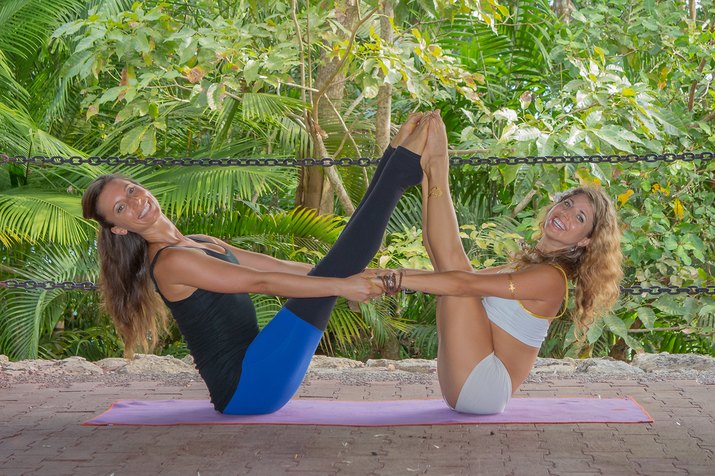
5. Bound Double Boat
Take your double boat one step further by adding a bind. Just like double boat, this core-strengthening partner pose is great for balance and flexibility as well as incorporating a bit of upper-body strength. HOW TO DO IT: Start seated and facing your partner with knees bent. Lift your feet off the floor until your knees are bent at 90 degrees. Your palms should start behind you on the floor to stabilize as you connect the soles of your feet together. Using your core strength to keep your spine long and tailbone tilted so you have length from the sacrum, press your feet together and up to the sky until the legs are as straight as you can get them. To bind the hands, reach one hand out to clasp the wrist and hand of your partner, keep your heart lifted as you reach the other arm to clasp the other wrist and hand of your partner. Lift your heart and lengthen the spine and look straight at your partner or out to the side.
Related: 13 Reasons to Start Yoga
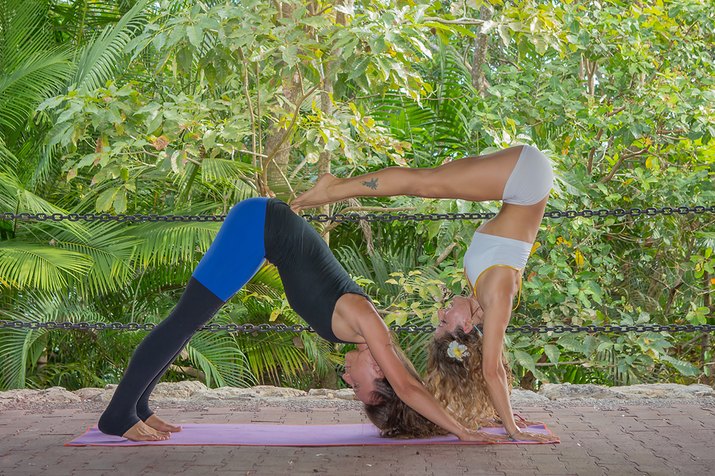
6. Downward Dog Handstand Pike
For those partners that are a bit more advanced, try this AcroYoga pose that combines two different yoga poses. HOW TO DO IT: The base starts out in downward-facing dog with palms flat, spine long and knees straight. Root down into the palms and heels to create stability, preparing for the flyer. The flyer steps in front of the base and folds forward, placing both hands either inside or in front of the base's hands. Stepping one foot at a time, the flyer will place one foot (just the toes) on the sacrum of the base (tailbone area) and then the other foot, pressing into a pike position (body is at 90 degrees) with the core engaged and the spine long. Rooting into the palms, hold for five to 10 breaths. To dismount, step down one foot at a time.
Related: 11 Yoga Poses to Detoxify Your Body
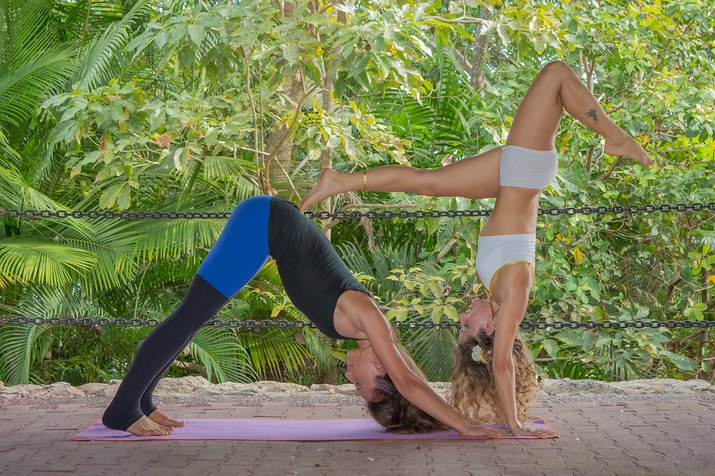
7. Downward Dog With Handstand Variation
Make sure that both of you are solid in these poses separately before trying to combine them: This is an advanced variation of the last pose. HOW TO DO IT: The base starts out in downward-facing dog with palms flat, spine long and knees straight. Root down into the palms and heels for stability, preparing for the flyer. The flyer approaches this pose basically the same way as the handstand pike. Stand near or in front of the base's hands and fold forward. Step one foot at a time up to the base's sacrum, being careful not to put too much weight into your feet. Bring one leg up and over so that your foot reaches for your head. Hold for three to five breaths before reversing the entrance and gracefully exiting the pose.
Related: 12 Amazing Paddleboard Yoga Poses (and How to Do Them)
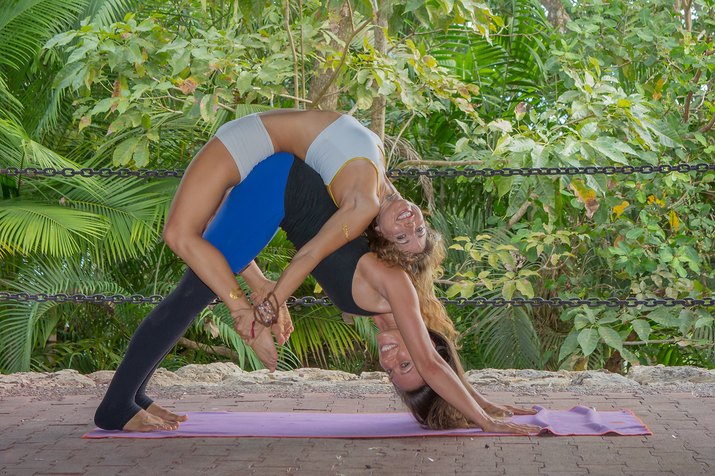
8. Downward Dog Camel
You'll need a lot of patience for this pose because you likely won't find the right positioning for your back on the first try, and your base has to remain steady the entire time. But with some trial and error, you'll be able to master this beautiful pose. HOW TO DO IT: The base starts out in downward-facing dog with palms flat, spine long and knees straight. Root down into the palms and heels for stability, preparing for the flyer. The flyer will stand with her back facing the base's legs, straddle the base's legs and backbend over the base so that the flyer's lower back rests on the base's butt. This pose requires some adjusting, so move around to find the best and most stable position. From there, the flyer grasps both ankles to complete the pose. Step down gently and gracefully.
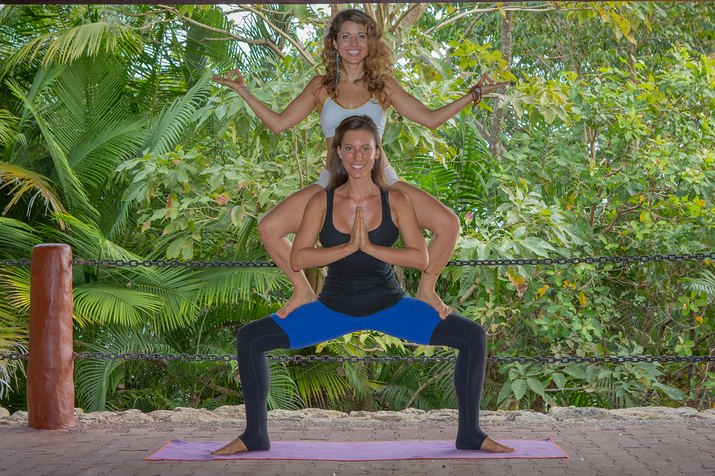
9. Double Goddess
Smile and enjoy the balance and strength of this powerful partner pose. HOW TO DO IT: The base starts out in goddess pose. Both knees are bent, and the feet are pointed out to either side in alignment with the knees. With a straight spine, strong core and low hips, the flyer will step up one foot at a time onto the upper thigh (foot is actually close to the hip crease of the base for the most stability) and do the same pose. Arms can be in any variation they prefer -- prayer, extended prayer, mudras, etc.
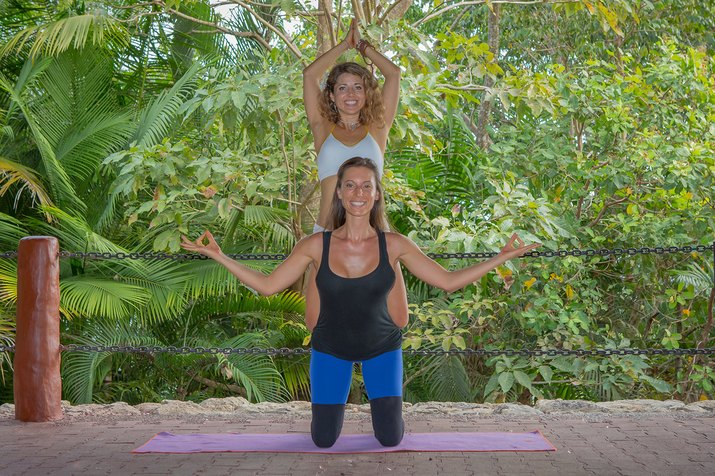
10. Yogi Stack
Both partners should have strong, stable backs for this seemingly basic yet deceptively challenging pose. HOW TO DO IT: The base starts kneeling with palms in front of them on the mat, tilting the tailbone back to create a shelf for the flyer to kneel on. The flyer then steps onto the base's back with her knees and kneels on his lower back. It shouldn't hurt, but should feel good for the base -- like a massage with the knees. Using core control and balance, the flyer and base both lift their chests and hold the arms in any variation. Remember to smile, then step down gracefully.
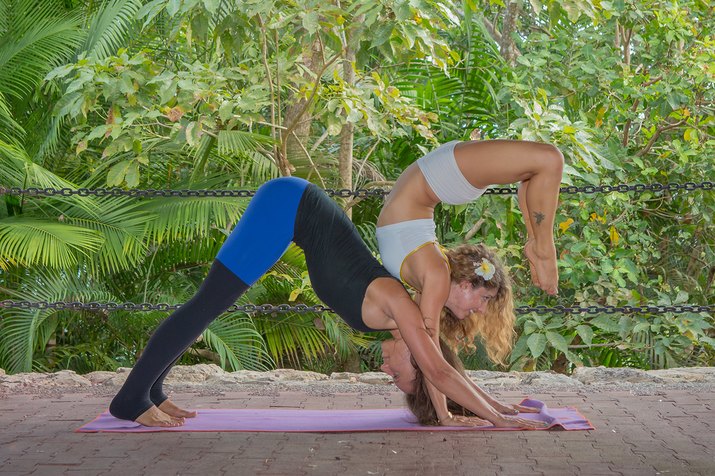
What Do YOU Think?
Have you ever tried AcroYoga? What did you think? Which poses did you try? Which poses were the most challenging? Will you try any of these poses? Share you thoughts, questions and stories in the comments section below!
Video of the Day
Video of the Day